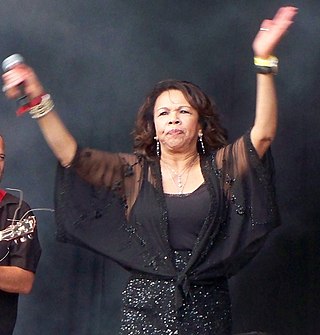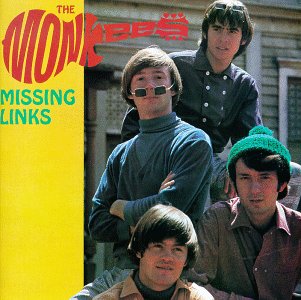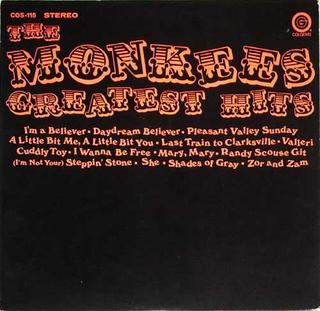Related Research Articles

The Monkees were an American pop rock band formed in Los Angeles in the mid-1960s. The band consisted of Micky Dolenz, Davy Jones, Michael Nesmith, and Peter Tork. Spurred by the success of the television show of the same name, the Monkees were one of the most successful bands of the 1960s. With international hits, four chart-topping albums and three chart-topping songs, the band sold more than 75 million records worldwide.

George Michael Dolenz Jr. is an American actor, musician, TV producer and businessman. He was the drummer and one of two primary vocalists for the pop-rock band the Monkees, and a co-star of the TV series The Monkees (1966–1968).

The Monkees is the debut studio album by the American band the Monkees. It was released on October 10, 1966 by Colgems Records in the United States and RCA Victor in the rest of the world. It was the first of four consecutive U.S. number one albums for the group, taking the top spot on the Billboard 200 for 13 weeks, after which it was displaced by the band's second album. It also topped the UK charts in 1967. The Monkees has been certified quintuple platinum by the RIAA, with sales of over five million copies.

Changes is the ninth studio album by the Monkees. The album was issued after Michael Nesmith's exit from the band, leaving only Micky Dolenz and Davy Jones to fulfill the recording contract they had signed in the mid-1960s. Changes was their last new album for Colgems Records and the group's last album of all new material until Pool It!, released in 1987.

Pool It! is the tenth studio album by American pop rock band the Monkees, released in August 1987 by Rhino Records. It was the first Monkees studio album of new material since Changes in 1970 and the first Monkees album to feature Peter Tork since the 1968 Head soundtrack.

The Birds, the Bees & the Monkees is the fifth studio album by the Monkees, and their first album released after the cancellation of their TV show. Released in April 1968, it was the first Monkees album not to reach Billboard's number one, peaking at No. 3 on the U.S. charts. It was also their first album to miss the UK charts altogether, with their four previous efforts all having reached the top ten. The album has sold over a million copies.

Canzetta Maria "Candi" Staton is an American singer–songwriter, best known in the United States for her 1970 remake of Tammy Wynette's "Stand by Your Man" and her 1976 disco chart-topper "Young Hearts Run Free". In Europe, Staton's biggest selling record is the anthemic "You Got the Love" from 1986, released in collaboration with the Source. Staton was inducted into the Christian Music Hall of Fame and is a four-time Grammy Award nominee.

"Daydream Believer" is a song composed by American songwriter John Stewart shortly before he left the Kingston Trio. It was originally recorded by the Monkees, with Davy Jones singing the lead. The single reached No. 1 on the U.S. Billboard Hot 100 chart in December 1967, remaining there for four weeks, and peaked at No. 5 on the UK Singles Chart. It was the Monkees' third and last No. 1 hit in the U.S.

Missing Links is a compilation album of rare and previously unreleased songs by the Monkees, issued by Rhino Records in 1987. It is the first volume of a three-volume set, followed by Missing Links Volume Two in 1990 and Missing Links Volume Three in 1996.

The Monkees Greatest Hits is the first greatest hits compilation album by the Monkees, issued by Colgems in June 1969.
Bell Records was an American record label founded in 1952 in New York City by Arthur Shimkin, the owner of the children's record label Golden Records, and initially a unit of Pocket Books, after the rights to the name were acquired from Benny Bell who used the Bell name to issue risque novelty records. A British branch was also active in the 1960s and 1970s. Bell Records was shut down in late 1974, and its assets were transferred to Columbia Pictures' new label, Arista Records.

This is a list of official recordings by The Monkees.

"A Little Bit Me, a Little Bit You" is a song written by Neil Diamond, recorded by the Monkees in 1967 and released as a single on the Colgems label. The lead vocal was Davy Jones' first on a Monkees single. The single reached No. 1 on the Cashbox Top 100 chart, while on the Billboard Hot 100 it reached No. 2, with "Somethin' Stupid" by Frank Sinatra and Nancy Sinatra keeping it from the top spot.
"Mary, Mary" is a song written by Michael Nesmith and first recorded by the Paul Butterfield Blues Band for their 1966 album East-West. Nesmith's band, the Monkees, later recorded it for More of the Monkees (1967). Hip hop group Run–D.M.C. revived the song in the late 1980s, with an adaptation that appeared in the U.S. record charts.

20th Anniversary Tour 1986 is a live album by the Monkees recorded during their 20th anniversary tour in 1986. To date, it is the only known complete concert recorded during this era. The recording was available at 1987 tour stops in double-LP and cassette formats, though a planned 1988 retail release by Rhino Records was ultimately scrapped. The record credited the artists as Davy Jones, Micky Dolenz, Peter Tork to avoid paying royalties to Arista Records who owned the Monkees trademark at the time, though the band's logo is visible on the sleeve. A limited-edition CD was released in 1994 under the title Live! by the group's fan club in Nashville, and was sold at concerts during their 1996 tour.

"Good Clean Fun" is a song by The Monkees from their 1969 album The Monkees Present. Recorded on June 1, 1968, it was released on Colgems single #5005 on September 6, 1969. Written and sung by Michael Nesmith, the song's title is never heard in the lyrics.

Tear Drop City is a single by The Monkees released on February 8, 1969 on Colgems #5000 recorded on October 26, 1966. The song reached No.56 on the Billboard chart, no.37 on cash box. The lyrics are about a man who feels low because his girlfriend has left him. Written by Tommy Boyce and Bobby Hart, it was the first single The Monkees released as a trio. Micky Dolenz performed the lead vocal. Boyce and Hart produced and arranged the song.

"Listen to the Band" is a song by American pop rock band the Monkees, released on Colgems single 5004 on April 26, 1969. Written by Michael Nesmith, it is the first time Nesmith sang lead vocals on a Monkees single A-side.

"Goin' Down" is a song by the American pop rock band the Monkees, written by all four members of the group along with Diane Hildebrand. It was first released as the B-side to the "Daydream Believer" single on Colgems Records on October 25, 1967, in support of the band's fourth album, Pisces, Aquarius, Capricorn & Jones Ltd. The song managed to bubble under the Billboard Hot 100 upon its release.
"Christmas Is My Time of Year" is a Christmas single written by Howard Kaylan and Chip Douglas, both members of the Turtles.
References
- ↑ Cafarelli, Carl; Pig Gold, Gary (2001). "Good Clean Fun". In Cooper, Kim; Smay, David (eds.). Bubblegum Music is the Naked Truth. Los Angeles: Feral House. pp. 75–79.
- 1 2 3 4 Sandoval, Andrew. Changes (liner notes). 24 September 1994. In McCutcheon, J. D. "Compact Discs: Rhino Wave 1". Monkee45s.net. Retrieved 24 January 2019.
- ↑ Ehrbar, Greg. "'The Archies' America on Records". Cartoon Research. 1 July 2014. Retrieved 24 January 2019.
- 1 2 Sandoval, Andrew. The Monkees: The Day-by-Day Story of the 60s TV Pop Sensation. London: Backbeat Books (2005) p. 276.
- ↑ McCutcheon, J. D. "USA: Bell 986". Monkee45s.net. Retrieved 24 January 2019.
- ↑ "The Neil Brian Goldberg Story". Remember America. Retrieved 24 January 2019.
- ↑ "Candi Staton". Discogs. Retrieved 24 January 2019.
- ↑ "Do It in the Name of Love / The Thanks I Get for Loving You". 45cat. Retrieved 24 January 2019.
- ↑ Whitburn, Joel. Top Pop Singles 1955-2002 (1st ed.). Menomenee Falls, Wisconsin: Record Research Inc. (2003) p. 674.
- ↑ Whitburn, Joel. Top R&B/Hip-Hop Singles: 1942-1995. Menomenee Falls, Wisconsin: Record Research Inc. (1996) p. 419.
- ↑ "Soul Train Hits That Made It Happen". Discogs. Retrieved 24 January 2019.
- ↑ "Top 20 Greatest Hits". Discogs. Retrieved 24 January 2019.
- ↑ "Candi Staton". Discogs. Retrieved 24 January 2019.
- ↑ "The Ultimate Fame Years Collection". Discogs. Retrieved 24 January 2019.
- ↑ "Evidence: The Complete Fame Records Masters". Discogs. Retrieved 24 January 2019.
- ↑ "Sweet Feeling". Discogs. Retrieved 24 January 2019.